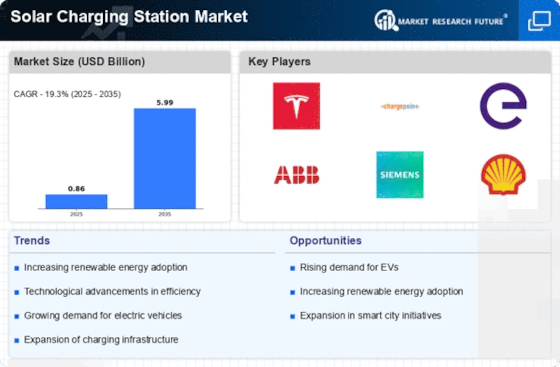Top Industry Leaders in the Solar Charging Station Market
*Disclaimer: List of key companies in no particular order
Top listed global companies in the Solar Charging Station industry are:
Sundial Solar Solutions
Solarsense UK Limited
VCT Group
Giulio Barbieri SRL
PROINSO
MDT SUN PROTECTION SYSTEM AG
SunPower Corporation
INHABIT Solar
Sunworx Solar
Solarstone
Bridging the Gap by Exploring the Competitive Landscape of the Solar Charging Station Top Players
The solar charging station market is experiencing a thrilling surge, fueled by the rising adoption of electric vehicles (EVs) and a global commitment to clean energy. This burgeoning space is attracting a diverse range of players, each vying for a slice of the pie. Navigating this dynamic landscape requires a keen understanding of the key player strategies, market share analysis factors, and emerging trends shaping the competitive scenario.
Key Player Strategies:
Established Energy Giants: Traditional energy companies like Shell and BP are leveraging their existing infrastructure and brand recognition to enter the solar charging market. They are focusing on building large-scale charging networks along highways and in strategic locations, offering seamless integration with their existing fuel stations.
Technology Innovators: Tech players like Tesla and ABB are at the forefront of developing advanced charging technologies. They are pushing the boundaries with faster charging speeds, smart grid integration, and energy management solutions. Their focus on user-friendly interfaces and connected car ecosystems is also winning customer hearts.
Start-up Disruptors: Nimble start-ups like ChargePoint and Volta are disrupting the market with innovative business models. They are offering flexible charging solutions for homes, workplaces, and public spaces, often with pay-per-use or subscription models. Their focus on affordability and accessibility is making them popular among budget-conscious consumers.
Government and Utilities: Governments and utilities are also playing a crucial role in developing the solar charging infrastructure. They are implementing tax incentives, subsidies, and grants to encourage private investment and deployment of charging stations. Additionally, they are collaborating with private players to build charging networks in underserved areas.
Market Share Analysis Factors:
Product Portfolio: The breadth and depth of a company's product offerings, ranging from simple AC chargers to high-powered DC fast chargers, plays a significant role in market share. Offering customized solutions for various segments like residential, commercial, and fleet applications is also crucial.
Geographical Footprint: The ability to establish a strong presence in key markets with high EV adoption rates, particularly in developed economies and urban centers, is vital for gaining market share. Building strategic partnerships with local players can also be beneficial.
Technology and Innovation: Continuous investment in research and development, leading to advanced charging technologies, efficient energy management systems, and user-friendly platforms, can give a competitive edge.
Brand Reputation and Customer Service: Building a strong brand reputation for reliability, quality, and excellent customer service is essential for attracting and retaining customers in a competitive market.
New and Emerging Trends:
Integration with Renewable Energy Sources: Integrating solar panels directly into charging stations is gaining traction, creating self-sufficient charging units. This trend promotes energy independence and reduces reliance on the grid.
Wireless Charging Technology: Wireless charging solutions, eliminating the need for cables and plugs, are gaining attention for their convenience and ease of use. This technology is still in its early stages but holds immense potential for the future.
Vehicle-to-Grid (V2G) Technology: V2G technology allows EVs to act as energy storage units, sending excess solar power back to the grid during peak demand. This creates a win-win situation for EV owners and energy providers.
Smart Grid Integration: Integrating charging stations with smart grids allows for dynamic pricing, efficient energy distribution, and optimized grid management. This trend is crucial for ensuring a stable and sustainable charging infrastructure.
Overall Competitive Scenario:
The solar charging station market is characterized by intense competition, with established players, innovative tech companies, and disruptive start-ups all vying for market share. The success of any player will depend on their ability to adapt to the evolving market dynamics, embrace new technologies, and offer compelling value propositions to customers. As the EV market continues to grow and renewable energy becomes more prevalent, the competition in the solar charging station market is only going to intensify, making it a fascinating space to watch unfold.
Latest Company Updates:
Sundial Solar Solutions:
- October 2023: Partnered with SMA Solar Technology to offer a complete EV charging solution that includes solar panels, inverters, and EV chargers. (Source: Sundial Solar Solutions website)
Solarsense UK Limited:
- September 2023: Secured a contract to install 50 rapid EV chargers at motorway service stations across the UK. (Source: Solarsense UK Limited press release)
VCT Group:
- November 2023: Acquired a major solar energy developer in the United States, expanding its reach in the North American market. (Source: VCT Group press release)
Giulio Barbieri SRL:
- December 2023: Unveiled a new line of ultra-fast EV chargers that can charge an EV in under 15 minutes. (Source: Giulio Barbieri SRL website)
PROINSO:
- January 2024: Announced the launch of a new solar-powered EV charging station that can be deployed in off-grid locations. (Source: PROINSO press release)










